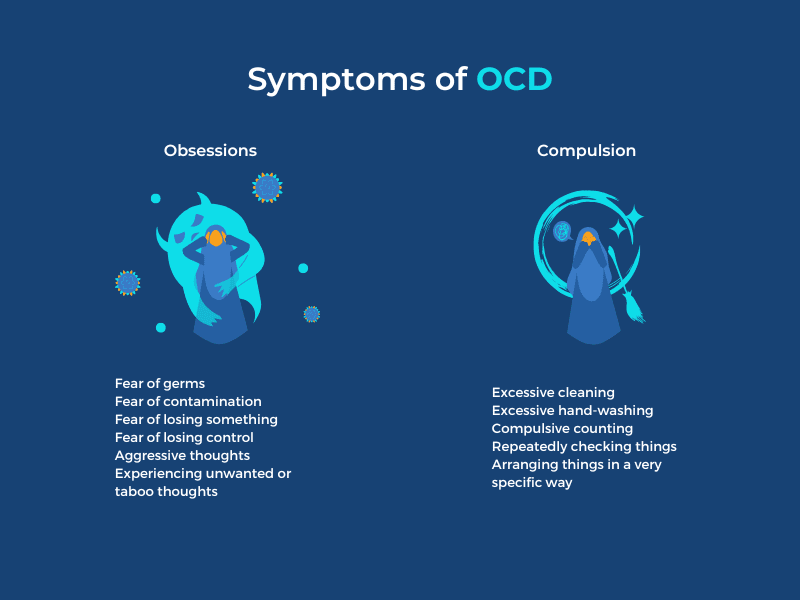
Obsessive-Compulsive Disorder (OCD) is a common and long-lasting mental disorder characterized by uncontrollable and recurring thoughts and behaviors that a person feels the urge to repeat.
Someone with OCD can experience symptoms of obsessions, compulsions, or both.
Obsessions are repeated intrusive thoughts or urges that cause a person to feel anxious. Compulsions are behaviors that a person feels the need to repeat or do as a response to an obsession.
The symptoms of OCD can impact a person’s everyday life and responsibilities like work, school, and relationships.

The Continuum of Care
Access a full range of treatments for mental health and substance use disorders. Whether you need a safe transitional living community, inpatient care, or outpatient therapy, we have a program to help.
OCD is a common disorder that can affect people from early childhood to later adulthood.
According to the Archives of Disease in Childhood, OCD had an estimated prevalence of 0.25% to 4% in children and adolescents.
The cause of OCD is unknown; however, a variety of risk factors may contribute to the development of OCD in teens, such as:


Many people may feel the need to double-check things or have certain habits or a routine that they like to follow.
This doesn’t necessarily mean that a person has OCD.
You may need OCD treatment if:
Many teens may display changes in their behaviors and moods as they transition through their teenage years.
In some cases, OCD can be mistaken for other mental health disorders such as anxiety, depression, or tic disorders. Children and young people with OCD may not recognize that their behaviors or actions are different than normal behaviors.
A teen with OCD may become upset or stressed if something is not in order. They may repeatedly check things at home or when they are in school. Because of this, they may also spend significantly longer completing things.
A teenager with OCD may also resist changes or become anxious when changes happen. They may also not want to dirty their hands or touch things. And excessively wash their hands or clean and organize their surroundings.
If you think your teen is showing signs of OCD, seeking help from their healthcare provider or a mental health professional can help give a proper diagnosis and the resources you may need to get help.

Effective treatment for OCD typically involves psychotherapy and medication. Psychotherapy has proven to be effective in treating OCD in adults and children and, in many cases, can be just as effective as medication.
Therapy Treatments
We deliver evidence-based therapy treatment for teens in a number of areas. We’re available 24/7 to answer any questions.
Young people with OCD may need extra help and support when it comes to recognizing triggers and managing the symptoms of OCD.
If your teen is struggling with OCD, it is important to learn more about it. By learning as much as possible, you are better equipped with the tools you need to give your loved ones strong support and help when needed.
It is also important to have healthy communication between you and your teen. You want to be open and ensure they are comfortable sharing things with you, like what they are going through or how they feel.
If your teen is experiencing signs of OCD, you can help by reaching out to their healthcare provider or another professional to get a proper diagnosis and determine the next steps you can take.
If you think you may be struggling with OCD, it is important to seek help and see what different options you have.
It is helpful to get a proper diagnosis so that symptoms do not worsen over time and that you are aware of any steps you can take to help yourself or your loved ones.
Treatment can help individuals manage their symptoms, and there are additional ways to help yourself at home if you are struggling with OCD.
Outside of treatment, some things that can help teenagers manage symptoms of OCD include:
There are certain ways you can make an effort to break an OCD habit. It doesn’t have to be a big consequence, just one that brings your attention to the specific habit.
Bringing recognition and awareness to your habits is an important part of changing them. By making a conscious decision to do something, you can begin to change your habits.
Understanding the processes that lead you to these actions and what triggers these habits is also essential. By understanding how you get there, you can better understand how to change it.
Some things you can try include:
You can try to break the thought cycle or habit by calling someone, journaling, taking a walk, or engaging in a different task.
By making small changes, like the order of your action, how many times you repeat it, or how you do it, you can start to change your habits.
If you have a compulsion, try setting a later time for it. Little by little, try to keep delaying until your urges decrease.
When you find yourself repeating the same habit, perform a specific consequence such as putting money in a jar or texting someone to become more aware.
Our goal is to provide the most helpful information. Please reach out to us if you have any additional questions. We are here to help in any way we can.
It is difficult to pinpoint the exact cause of the onset of OCD.
Research suggests that certain factors like genetics, brain structure, and stressful environments play a role in the development of OCD.
During puberty, adolescents face many changes and new challenges.
Their minds and bodies are rapidly developing and can lead to worsening symptoms of OCD for young people, especially with the extra load of stress.
It can also be difficult for teens and adolescents to recognize their symptoms and understand how to cope with them, causing them to get worse over time without the proper treatment.
Genetics may play a role in the development of OCD; however, parenting does not cause OCD.
When any child or family member is struggling with a mental disorder, sometimes parents are quick to place blame on themselves or think about the things they could’ve changed in the past.
It is important to not blame yourself and to rather focus on ways you can help and support your teen.
Learning more about things that may trigger or impact your child’s mental health conditions can help you make a change and be there for them.
OCD does not typically go away with age and is a longtime mental illness.
However, with treatment, symptoms of OCD can become more manageable.
Some people may find that their symptoms may fluctuate over time, and as they get older, they may learn more about how to handle stress and triggers, making it easier to cope with their mental illness.
Yes, OCD can affect many aspects of a teen’s life.
It can make it difficult to concentrate and perform in school. For example, they may take longer to complete things because they may have to check their work repeatedly or need to have their notes organized in a very specific way.
Obsessive thoughts can also make it very difficult to focus. Especially for teens, as they are transitioning into new environments and experiencing many changes, it can sometimes become quite overwhelming.
It can also impact a young person’s social life and make it hard for them to interact and relate to others.
If a teenager struggles to make friends or socialize, it can make them feel very isolated and not want to go to school or feel motivated to get things done.
Stress is a major component in worsening the symptoms of OCD.
When someone is experiencing major stress, it can not only impact OCD but also strain many aspects of their life.
Additionally, unhealthy habits such as a poor diet or lack of sleep can make OCD worse.
Substance abuse and mental health disorders commonly co-occur in young people because they turn to drugs as an unhealthy coping mechanism or a way to self-medicate. Each condition can worsen the other.
According to BMC Psychiatry, sleep disturbances are prevalent in OCD patients; up to 48% of patients report these disturbances.
Some individuals who have OCD report that they experience increased nighttime awakenings and experience poor quality of sleep depending on how severe their symptoms are.
It may be hard for a person with OCD to sleep at night because their obsessive thoughts can keep them up, and the quietness of the night may make them feel stuck or alone with their thoughts.
No, Teen OCD is not curable; however, it is treatable.